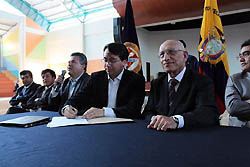

(ANS – Cuenca) – The Salesian province of Ecuador, through the Salesian National Council for Education (CONESA) and the communications company Edibosco-LNS have signed an agreement to begin a Digital Pedagogical Project called ESEMTIA. The signing ceremony took place on Monday 13 May at the Miguel Merchán Gymnasium of the Salesian Technical Training Centre in Cuenca.
The signatories were Fr Javier Herrán, Rector of the Salesian Polytechnic University;
Fr Juan Cárdenas, President of CONESA; Dr Marcelo Mejía, Delegate for Communications, and two representatives of Edibosco-LNS.
ESEMTIA is an Information Technology platform of the Salesian Publishers EDEBÉ of Barcelona, which offers educational services through a whole range of instruments and resources for school management. The project has been in existence for 12 years and operates in more than 500 schools. It was the first programme in Spain to facilitate communication between school and home.
The Salesian schools in Ecuador intend to use this means to promote a digital pedagogical model in the web 3.0 era and hope that it will improve interaction between school and home. The virtual school of learning is thus becoming a new paradigm.
On 13 May also, about 200 teachers from the Carlos Crespi and Yanuncay campuses were trained in the use of the programme. Over the next few months, this experience will be repeated in eight other Salesian schools: STAR in Riobamba; Cristóbal Colón, Domingo Comín and Domingo Savio in Guayaquil; Dominic Savio Educational Centre and the Don Bosco Centre at Cayambe; and the Cardinal Spellman and Don Bosco Educational Centre at Kennedy in Quito.
This platform offers many advantages. It facilitates quick, easy and efficient management of information. It allows for the use of information to improve educational services. It contributes to the creation of elements and procedures for school evaluation, and for student learning. Finally, it will allow parents to monitor the academic progress of their children directly from home.
The second phase of the project will include digitalization of textbooks and the regular use of virtual learning environments such as AVAC (Virtual Classrooms for Cooperative Learning).
Published 20/05/2013
